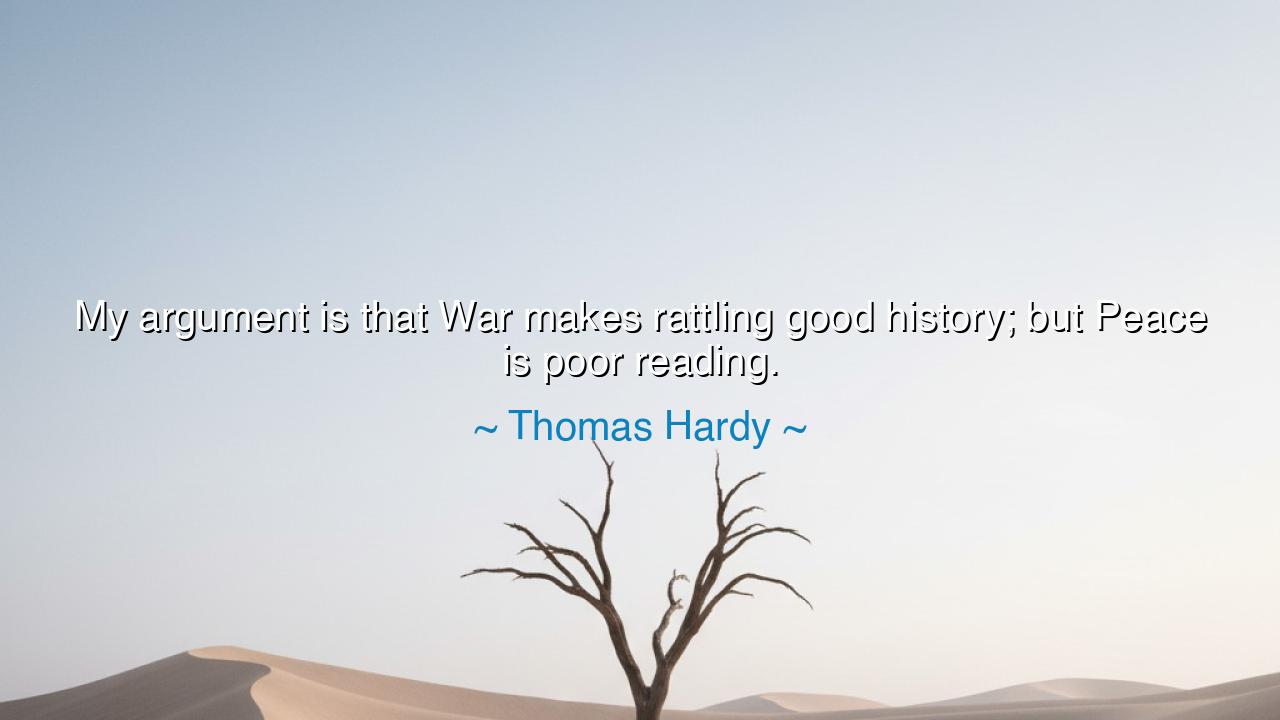
My argument is that War makes rattling good history; but Peace is






“My argument is that War makes rattling good history; but Peace is poor reading.” So declared Thomas Hardy, the poet and seer of human fate, whose pen traced the trembling border between beauty and despair. In these words lies both irony and lament — a truth that mankind has known since the dawn of time, though few have dared to speak it aloud. For Hardy saw what many deny: that the world remembers its tragedies far more vividly than its calm; that the drums of War echo louder in history’s pages than the whispers of Peace. His words are not a celebration of bloodshed, but a sorrowful recognition of the human appetite for conflict — and the silence that too often greets harmony.
Across the scroll of the centuries, the tale is the same. The names of conquerors — Alexander, Napoleon, Caesar — blaze like fire upon the parchment of time, while the healers, the peacemakers, the quiet builders of prosperity fade into the soft mist of forgetfulness. War, with its thunder and spectacle, seizes the imagination. It paints history in bold colors — red and gold, glory and grief — while Peace, gentle and enduring, moves too slowly for the impatient heart of man. Hardy, wise in his melancholy, understood that our species, enamored of drama, mistakes noise for meaning and turmoil for greatness.
Consider, for example, the tale of World War II, that vast and terrible storm that reshaped the earth. Its battles are studied in classrooms, its generals idolized, its horrors immortalized in film and song. Yet the long and noble decades that followed — the rebuilding of nations, the forging of alliances, the nurturing of peace — are seldom given the same reverence. The world remembers D-Day and Stalingrad, but who recalls the quiet meetings where men and women built the frameworks of lasting stability? Hardy’s sorrow lives in this imbalance — the tragedy that peace, though precious, fails to stir the imagination as war does the blood.
And yet, behind Hardy’s observation lies a mirror for the soul. For what is War but the external reflection of the inner turmoil of humankind? Each battle written in history begins first within the heart — the conflict of desire and fear, of pride and vengeance. Thus, when Hardy says war makes “rattling good history,” he speaks not only of armies, but of our own restless nature. We are drawn to struggle because struggle feels alive; we are lured to destruction because it shouts where peace merely whispers. To learn from him is to see that our fascination with conflict reveals as much about ourselves as it does about the world.
But should we then despise Peace because it is quiet? No, my child of the future — we must learn instead to listen for its song. For peace is not the absence of story; it is the deep current beneath it. It is the farmer’s steady labor after the fires are extinguished, the mother’s lullaby over the cradle, the architect’s hand rebuilding what was shattered. These acts do not roar, but they endure. The peace that rebuilds after war is not poor reading to the wise; it is the sacred text of resilience. Only the shallow eye overlooks it, only the hurried heart grows bored of its stillness.
The ancients, too, wrestled with this truth. When the historian Thucydides chronicled the Peloponnesian War, he wrote of speeches, of sieges, of betrayal and ruin — and his work has survived for millennia. Yet when Athens and Sparta laid down their arms, few recorded the healing that followed. It is easier to recount the fall of cities than the mending of souls. Hardy’s words, therefore, are both a challenge and a warning: if peace seems dull to us, it is because we have not yet learned to see its grandeur.
So take this lesson to heart, O reader of ages: do not let the noise of war drown the wisdom of peace. When you tell the stories of your time, honor not only the battles fought, but the bridges built afterward. Let your admiration fall not upon those who destroyed, but upon those who restored. Learn to find beauty in the quiet moments — in mercy, in patience, in the slow dawn after the storm. For though War may make “rattling good history,” it is Peace that makes a lasting civilization. And in the end, it is not the clash of swords that sustains the world, but the hands that refuse to wield them.






AAdministratorAdministrator
Welcome, honored guests. Please leave a comment, we will respond soon